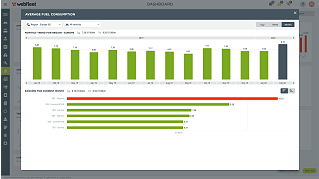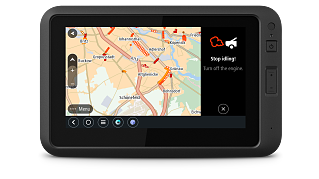







Webfleet gives you real-time insight into fuel consumption and driving behaviour like idling and cruise control engagement. This valuable information allows you to take steps to effectively slash total cost of ownership, reduce lorry fuel costs and cut carbon emissions. Find out more about fuel-efficient trucks.
Benefit from truck fuel efficiency
Lower your running costs
Improve lorry fuel efficiency and reduce CO2 emissions
Keep your company sustainable
Key features that enable truck fuel consumption
Real-time fuel monitoring
Improve fuel efficiency for your trucks with real-time fuel monitoring. Get clear insight into how fuel is being used on each trip. Notifications when the fuel level is low alert you to abnormal fuel loss or theft.


Track fuel usage over time
Real-time and historical insight into your truck’s fuel consumption and emissions allows you to spot trends or anomalies. Compare performance over time on the fuel efficiency dashboard, spot exceptional events and use this insight to optimise your operating costs.
Learn more about Webfleet ReportingProfessional truck navigation
Our PRO series Driver Terminals help to improve fuel efficiency for trucks, as they provide truck-specific navigation and accurate real-time traffic information. With your drivers on the most suitable routes, you avoid idling in traffic jams and driving unnecessary miles.
Learn more about professional navigation and traffic

Active driving style coaching
Your drivers get in-vehicle active driving feedback and advice through our PRO Driver Terminals, helping them cut out habits that waste fuel and increase CO2 emissions.
Learn more about PRO 8475 TRUCKEngage cruise control more often
In Webfleet, the trace on the map is coloured green where cruise control is engaged. You can also see cruise control usage in the trip report. This helps you identify drivers who require additional training in using cruise control.

All you need to know about fuel efficient trucks
What is the average fuel efficiency of trucks?
0
What is the average fuel efficiency of trucks?
0It depends on a couple of factors: 1. Truck size and payload and 2. What kind of environment the truck is travelling through (i.e., urban or interurban). Generally, a truck's average fuel efficiency is 30 to 40 litres of diesel for every 100km driven. Larger trucks with payloads of 23,500kg or so can consume up to 38 litres for every 100km. Smaller vehicles, and those with smaller loads, will of course use less fuel. A small truck with a payload of 16,000kg, for instance, consumes about 25 litres of diesel per 100km.
How much fuel does a lorry use per hour?
0
How much fuel does a lorry use per hour?
0Factors like speed and weather conditions will determine how much fuel a lorry uses per hour. According to figures from the Department of Transport, a truck consumes 1.9 litres of fuel per hour just by idling. At a speed of 37 miles per hour, a truck uses 4.1 litres. With a speed of 56 miles per hour, a lorry will consume 8.4 litres of fuel.
What impacts truck fuel efficiency the most?
0
What impacts truck fuel efficiency the most?
0Driver behaviour and vehicle condition are two of the biggest influences on fuel efficiency. Idling time, cruise control, acceleration and speed consistency are all in the driver's control. Webfleet's PRO Driver Terminals provide active feedback, helping drivers adopt more fuel-efficient habits behind the wheel. A roadworthy truck is a more fuel-efficient vehicle, so regular maintenance helps ensure that a vehicle's tyres, brakes and engine are in good working order.
Why is truck fuel efficiency important?
0
Why is truck fuel efficiency important?
0Fuel makes up a large chunk of the total cost of ownership—up to 38% for your fleet. If you're looking to cut costs (and what fleet owner or manager isn't?), fuel efficiency is key. Reducing CO2 emissions is vital, and fuel-efficient trucks undoubtedly produce less carbon.
How do you manage fuel for trucks?
0
How do you manage fuel for trucks?
0Digital tools that help you optimise fleet and driver performance are essential. A fleet management system like Webfleet makes it easy to track your fuel consumption in real time. Fuel efficiency is affected by road conditions and driver behaviour. With a digital fleet management system, you can keep your trucks on the best routes and glean insights on driver habits.
View our other solutions
Vehicle management
Vehicle management
- GPS tracking, fleet health monitoring and better scheduling of maintenance tasks.
Driver management
Driver management
- Driver identification, working hours and performance support, improved driving styles and increased safety.
Truck fuel efficiency
Truck fuel efficiency
- Real-time fuel monitoring and visibility over driving behaviour to cut costs and reduce carbon emissions.
Workflow optimisation
Workflow optimisation
- Seamlessly communicate with your team on the road to better manage workflow and ensure you deliver on time.

How to save fuel: the best ways to cut your fleet’s fuel costs

Fuel is a volatile and unavoidable cost. Read our eBook for practical fuel-saving strategies.
Want to boost your business?
Subscribe to our newsletter and get valuable fleet insights: free guides, advice, how-tos and more.
Return on investment in 6 to 9 months on average
Want to lower your running costs and improve fuel efficiency? Speak to one of our experts today.






Your consent is required
In this section, external content is being embedded from.
To display the content, your consent is required for the following cookie categories:
- Targeted Advertising
- Analytics & Personalization
- Essential
For further details, please refer to our privacy policy.If you are interested in how ###vendor_name### processes your data, please visit their privacy policy.








